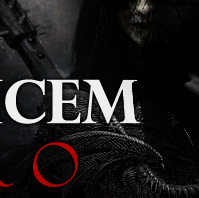

A-Lex by Sepultura
|
Release date : January 2009
Reviewed by Mark Fisher

Background information
Review

Background information
In mid September 2007 following a European tour, guitarist Andreas Kisser revealed the fact that Sepultura would begin writing material in support of its eleventh studio album during October. Sessions would occur at the studio of drummer Jean Dolabella in Belo Horizonte, Brazil following the birth of the man's child. Iggor Cavalera, who had drummed for Sepultura since its 1984 inception, had announced on January 13th, 2006 that he would take a break from music due to being a father for the fourth time. Media outlets reported the fact that Iggor had left the fold, something the group and the drummer himself aggressively refuted. In March, Dante XXI was issued, and the group embarked upon a European tour headlined by In Flames. Roy Mayorga (ex-Soulfly) handled drums upon the tour, but the position was short-term. Mayorga joined Stone Sour in May as a full-time member, and performed upon the outfit's sophomore album Come What(ever) May (issued in August). On June 12th, Cavalera's departure was confirmed, a chain of events blamed on “artistic incompatibility”. Ex-Udora member Jean Dolabella stepped behind the drumkit, filling the vacant position.
In actual fact, it wasn't until February 2008 that Sepultura begun writing in support of an eleventh studio album. Penning ideas at Trama Studios in São Paulo, the group decided to compose a conceptual full length based upon A Clockwork Orange. A 1962 novel by Anthony Burgess, it was later adapted by director Stanley Kubrick for a 1971 movie. In April, rehearsal footage of Sepultura performing a new track was made available. Starting April 21st, MySpace and Sepultura launched a contest dubbed Be A Part of the Next Sepultura Record. Fans were invited to submit a sentence or catchphrase related to A Clockwork Orange, and the contest came to a conclusion on May 11th. On the 23rd, MySpace and Sepultura would announce the winning sentence or phrase, and seven days later, the act would cut a track based upon the sentence / phrase within twenty-four hours. The full length's title was revealed to be A-Lex, both Latin for “no law” and “without law”, and a pun upon A Clockwork Orange's central character, Alex.
Produced by Sepultura and Stanley Soares at Trama Studios in São Paulo, A-Lex was mixed at Mega Studios, and mastered by George Marino at New York’s Sterling Sound studios. The album's lineup features; Derrick Green supplying vocals (Green has supplied vocals since 1998's Against), Paulo Xisto Pinto Jr. occupying bass, Andreas Kisser handling guitars, and Jean Dolabella behind the drumkit. Boasting eighteen tracks, it's reportedly a collection of Sepultura's studio jams recorded over a three-month period. In early September, more studio footage was made available. By November, it had been announced that A-Lex would see issue in late January 2009. On November 13th, 2008 at the ninth annual Latin Grammy Awards at the Toyota Center in Houston, Texas, Sepultura performed a track lifted from the album. In early December, “The Treatment” and “We've Lost You” were made available for streaming via the group's official MySpace page. Later in the month, audio samples of all the album's tracks were made available via SPV Records' official website. On December 15th from three p.m. to nine p.m. at Av. Eng Luis Carlos Berrini in São Paulo, Brazil, Sepultura filmed a music video in support of “We've Lost You”.
Review
In truth, this reviewer never thought the day would arrive where the mighty Sepultura released an album without either of the Cavalera brothers. Yet, here we are. The year is 2009, and Sepultura's eleventh studio album, A-Lex, is upon us.
“A-Lex I” and “Moloko Mesto” inaugurate Sepultura's post-Cavalera material, and listeners will likely feel somewhat apprehensive, even after listening to A-Lex's initial tracks. Green's voice is in prime form, however, consequently heightening the album's pacy beginnings. For that reason, “A-Lex I” and “Moloko Mesto” aren't lost upon the listener. In many ways, A-Lex's opening moments greatly resemble the opening moments of 1998's Against, although the pace is much, much quicker. These opening moments are particularly unrelenting, and so much so that they happen to be almost unpleasant. “Filthy Rot” seizes the listener's focus slightly more than its predecessors, and is certainly the cut which piques your interest in what could subsequently occur.
In usual instances, it's difficult to select highlights from an album which happens to be so lyrically tied together. However, it's quite easy to select highlights from A-Lex; the more dynamic numbers extremely venture forth, and seize the listeners' focus. “Sadistic Values”' dark, spiralling sound indisputably supplies one such highlight. Green's voice bears a demonic resemblance in this specific instance, and Kisser's distinct guitar sound unquestionably takes inspiration from the axeman's recent exploits - scoring films in his native Brazil. “Experiment”'s ferocity bears similarities to the anthems found upon 2001's Nation, and the track's greatness is more readily transparent upon its initial listen than much of the album's fellow tunes. The near Post-Hardcore number “Enough Said” concludes A-Lex's trio of highlights - unfortunately, the album's remaining tracks pale by comparison.
A-Lex's cuts were largely spawned by studio jam sessions, causing one to wonder as to whether this is instrumental to the album's chaotic sound. Whilst its predecessor, 2006's Dante XXI (a fellow concept album, but one which used Dante Alighieri's 14th century poem “The Divine Comedy” as its lyrical basis), was both dynamic and presentationally flawless, A-Lex is abrasive and untamed. Cool, intricate calculation isn't the album's chosen stylings, but rather the sound of a million fists swinging at the very same moment, each respectively attempting to land a punch in desperation. In this respect, A-Lex's sound greatly recalls the stylings employed by Superjoint Ritual's full lengths.
A-Lex's music is both chaotic, and precise, yet is additionally the most aggressive Sepultura full length since the group's mid-eighties material. During certain aspects, this works against Sepultura; the aforementioned inaugural tracks verify this opinion, featuring little to hold onto as they simply blow past the listener. During less frequent aspects though, this tribute to the group's earlier works proves quite delightful. These infrequent moments shape an interesting dynamic which, in turn, develop interest in A-Lex's lyrical content. Generally speaking, A-Lex is far from Sepultura's greatest album. The album particularly resembles the jam sessions which allegedly fathered the tracks, though if you admire records like 1987's Schizophrenia and 1989's Beneath the Remains, or even Against, then you'll be able to discover several gems upon A-Lex.















